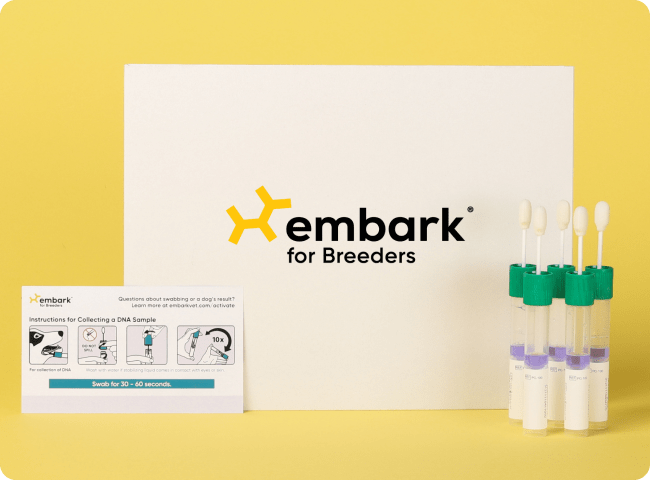Genetic Health Education
Expert articles about DNA testing from genetics 101 to best practices. Embark answers questions about the genetic coefficient of inbreeding, interpreting results, when to breed carriers and more.
Genetic Health Testing for German Shepherd Dogs
Embark for Breeders offers 12 breed-specific genetic health tests for the German Shepherd Dog among the genetic health conditions Embark tests for. Breeders can easily share breed-specific DNA test results on parents or puppies with the one-page DNA Health Summary report with Embark test results. Genetic health testing is an integral part of a sound...
Genetic Health Testing for Golden Retrievers
Embark for Breeders offers 11 breed-specific genetic health tests for the Golden Retriever among Embark’s genetic health conditions. Breeders can easily share breed-specific DNA test results on parents or puppies with the one-page DNA Health Summary report with Embark test results. Genetic health testing is an integral part of a responsible dog breeding program. When...
Genetic Health Testing for Labrador Retrievers
Embark for Breeders offers 20 breed-specific genetic health tests for the Labrador Retriever among the genetic health conditions Embark tests for. Breeders can easily share breed-specific DNA test results on parents or puppies with the one-page DNA Health Summary report with Embark test results. Genetic health testing is an integral part of a sound dog...
Donating to Research and Discovery Means Good Will to Dogs
This holiday season, give the gift of discovery with an Embark for Breeders DNA Kit for your breeder friends and new puppy owners. Each dog is tested across genetic markers and helps contribute to expanding Embark’s fast-growing database. This amount of data will lead to more novel discoveries sooner to help dogs live healthier,...
Planning Ahead for DNA Health Testing
Savvy breeders, especially those who like to plan ahead, take advantage of setting up a health testing timeline to keep breeding goals on track by buying Embark for Breeders Dog DNA Kits in quantity and even purchasing gift cards to help budget costs throughout the year. Genetic Health Testing The beauty of DNA testing...
Top 5 Reasons to DNA Test Before You Breed
Educating yourself about canine health is one of the best ways to learn about dog breeding. There are many health screenings and genetic test results to consider when making responsible decisions while planning a litter. Let’s explore the top five reasons why knowing the genetic health risk of your dog can improve the way you...
When Should I Order My DNA Test Kit?
Embark Veterinary is focused on providing comprehensive results in an efficient manner. Did you know over 95% of breeders receive their results less than 21 days after we receive their DNA kits? Still, we encourage breeders to plan ahead and order kits as soon as they know how many puppies or potential breeding dogs they...
Decode Your Dog’s Coat Type and Length
It’s always fun to highlight one of the most commonly observed traits in dogs, their unique coat types, and explain the underlying science that determines the outcome. Coats come in various forms ranging from the short, hard, wiry coats of terriers to the long, silky coats of many toy dogs. Part of a dog’s...
Advice on How to Avoid Common Mistakes and Pitfalls in Dog Breeding from Canine Health Summit Panelists
Many breeders find the companionship of their purebred dog so rewarding that they feel they would like to mate their dog, to continue the bloodline or keep a puppy. The Embark Canine Health Summit was a full two day virtual event where breeders, researchers, veterinarians and dog fanciers all came together to discuss how breeding...
Everything You Need to Know About the Embark Canine Health Summit
On February 15th and 16th, 2021 we witnessed Embark’s inaugural canine health event. Until now, there has been no other major dog health conference focused on bringing dog breeders of all experience levels together with veterinarians and the research community. Through conversation between all these groups, researchers and veterinarians can get the insights only breeders...
Measuring Inbreeding and How Genetic COI Can Help Your Breeding Program
Learn about genetic COI (coefficient of inbreeding) and how it can be used to inform breeding decisions with Aaron Sams, PhD. Many factors are considered when choosing which dogs to use in breeding programs including conformation, temperament, genetic disease mutations, and much more. Assessing the impact of inbreeding is another factor to consider. In this...
Webinar: The Art and Science of Breeding
A webinar presented by The Westminster Kennel Club and Embark Vet. Embark Veterinary and the Westminster Kennel Club Dog Show are pleased to present an informative panel discussion featuring three experts in purebred dog breeding, showing, and canine genetics. Watch this live video event to hear practical guidance and expert perspective relevant to all dog...




